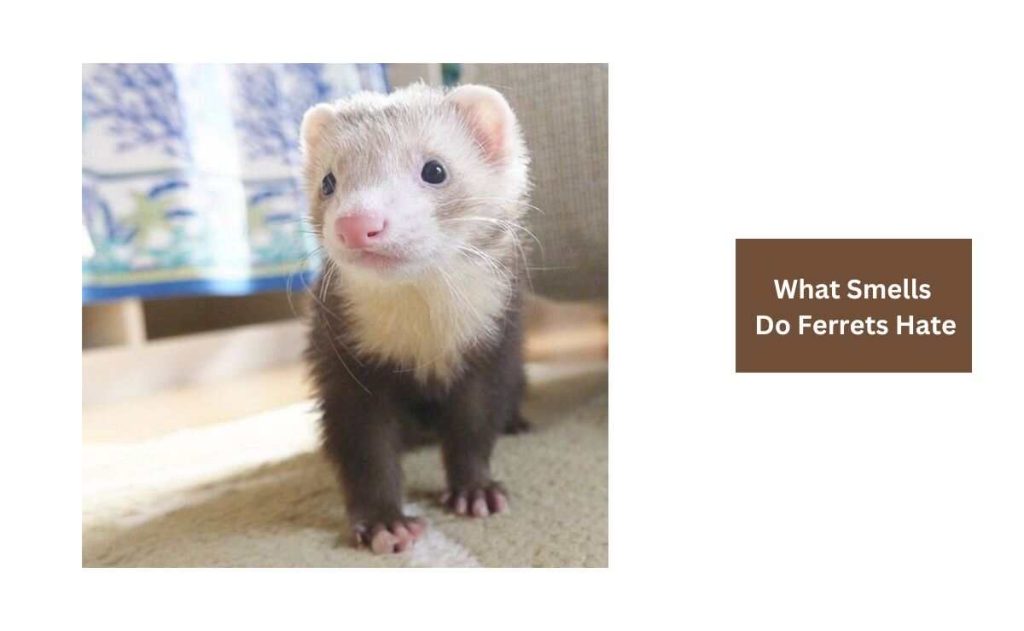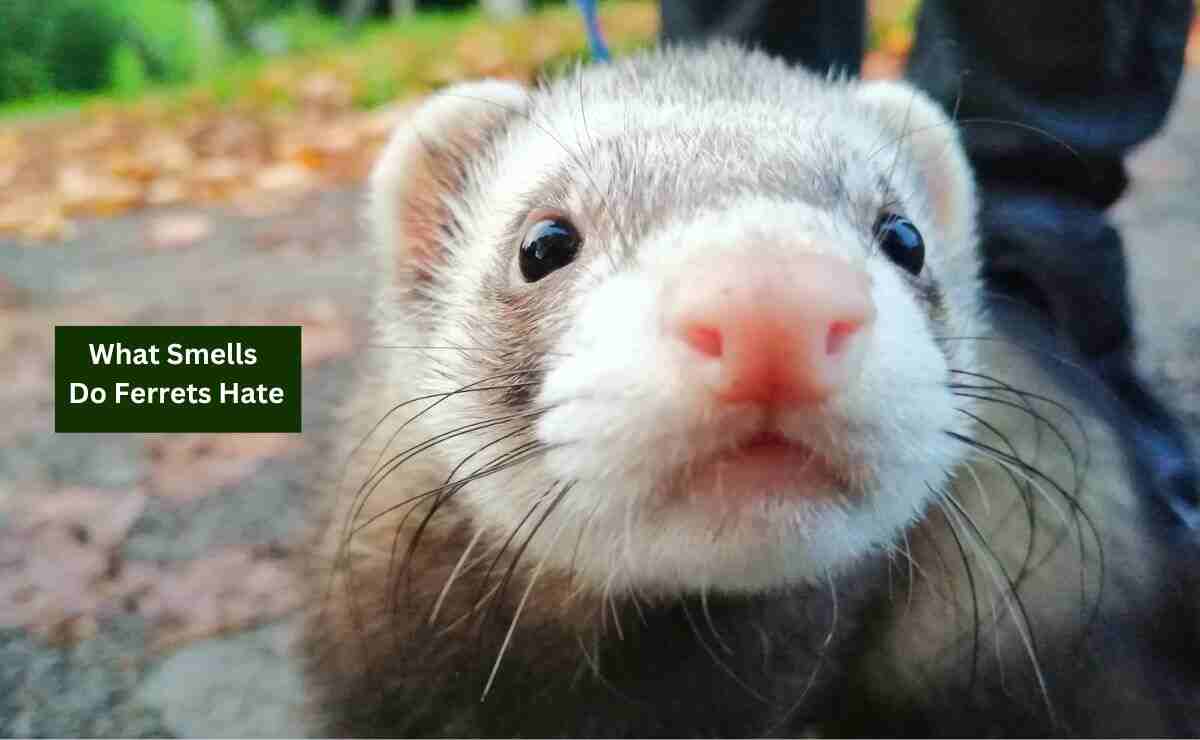Ferrets have a strong sense of smell, unlike other pets. As they are wild animals, they can smell things from a distant place. Thus there are certain smells that they can’t simply stand!
So, what smells do ferrets hate? They hate the smell of citrus, mint, and even some household cleaning products. They may find certain odors offensive, even if it doesn’t seem like a big deal to you.
If you want to explore more about your ferret’s smell choice, keep on reading!
Ferrets’ Olfactory Sense Explained
Ferrets are blessed with an advanced olfactory system. The eye sights of ferrets are not that strong; hence, they heavily depend on their sense of smell to communicate, differentiate, and hunt.
Ferrets have approximately 5 million olfactory receptors in their nasal epithelium. Moreover, they strongly depend on their sense of smell while exploring.
The behavioral study by Apfelbach in 1973, claims that ferrets will only respond to food-searching behavior when the odor of a known prey is present. This shows that a specific odor stimulates the sense of hunting in them, which is activated by olfactory glands.
Besides, they also use anal sac odors to mark territory and as a defense mechanism.
What Smells Do Ferrets Hate?

Ferrets are usually seen to be very curious to sniff new stuff they find around them. As their sense of smell is strong, it also creates adverse effects when they smell something they weren’t supposed to. According to many ferret owners, there are a few smells that their pets hate. Some of them are:
- Banana: Ferrets have a sensitive respiratory system. The extremely sweet smell of bananas is way too strong for them. If accidentally consumed more Bananas, it can clog their intestines or even kill them.
- Orange and peppermint oil: Ferrets cannot metabolize the phenols present in these strong essential oils like humans do. Moreover, the strong citrus scent of orange and peppermint oil is too strong for their nose. Most ferrets will run away if they can smell it anywhere near them.
- Orange peel: The scent of orange peel is just as overpowering and citrusy as the orange essential oil. The smell of an orange peel can often make their body lethargic or make them vomit.
- Vicks VapoRub: Studies show that VapoRub induces mucin secretion and increases inflammation in the airway. This is similar to acute inflammatory stimulation and may lead to mucus obstruction of the airway. In simple words, the smell of Vicks VapoRub will swell your ferret’s airway, which will lead to death.
- Cleaning Products: Almost all cleaning products have a strong, sweet scent that affects the ferrets. Their system cannot digest the phenol and baking soda present in it. Household cleaners like toilet cleaners pose poisonous risks to ferrets. Even shampoo, soap, or shower gels can make their respiratory tract swell, restricting air passage.
- Perfumes: Any kind of perfume that is sweet or citrusy will affect the ferrets. Their sensitive respiratory system is not strong enough to handle these scents.
- Smoke and Tobacco Odors: Nicotine and smoke can cause acute poisoning in ferrets. Any kind of smoke or nicotine in any form is toxic to them, thus they don’t like the smell.
- Strong Food Smells: Ferrets have delicate digestive systems along with respiratory systems. The smell of spices, seasoning, hot sauce, or chilies hits their respiratory tract, and their body is not ready to handle that.
- Chemical Odors: Chemical odors such as drugs and personal hygiene products often contain essential oils and substances that can cause death in ferrets. Additionally, the smell of gasoline is toxic to them because it’s too strong.
Ferrets’ Sense Of Smell Vs Human Sense Of Smell
The olfactory system of ferrets is way more developed and enriched compared to humans. Ferrets have approximately 5 million olfactory receptors in their nasal epithelium, whereas the human olfactory system only has 5000.
Additionally, ferrets have another olfactory organ named the vomeronasal organ that plays a significant role in detecting pheromones, which helps them communicate. This kind of feature is absent in the human olfactory system.
| Smell Features | Ferrets | Humans |
| Organs In The Olfactory System | Olfactory receptors around 5 million, the vomeronasal organ, accessory olfactory receptor | Olfactory receptor around 5000, accessory olfactory receptor |
| Vomeronasal Organ | The vomeronasal organ helps to identify or smell pheromones of other ferrets and humans | No such organs are seen in humans |
| Communication | Rely on communication by interacting, marking territory, and defending themself | Help to sense scent in certain situations but don’t rely that much for communication |
| Sensitivity | Has the ability to detect a high range of smells in a larger radius | Can determine a great array of scents but with lesser accuracy and in a smaller radius |
How To Manage And Avoid Smells That Ferrets Hate In Your Home?
To keep your pet ferret safe, you should consider tweaking your indoors a bit. To ensure their health is not affected, here are a few tips on how you can manage and avoid smells they hate:
- Avoid using incense and diffusers: Ferrets are super sensitive to smoke and essential oils. If you love using plug-in diffuser devices, place it in a place where your pet has no access to it. You can smell-proof the area so that it doesn’t reach where your ferret usually stays or plays.
- Discard the kitchen scraps immediately: Always make sure to pick up those orange peels, lemon peels, onion, and tomato scrapes that are often scattered on the countertop. Try to discard those immediately after you finish cooking.
- Keep the spices inside kitchen drawers: Instead of keeping your hot sauce or daily seasonings on your dining table, consider storing them inside the kitchen drawer. That way, there is less chance of them coming into contact with spicy items.
- Don’t consume alcohol in front of them: Ferrets are usually hyper-curious and might smell or take a taste of it while you’re not observing them. It can cause a bacterial infection or poisoning.
- Avoid getting house plants: Aloe vera, morning glory, baby’s breath, lily, tomato plants, etc. are all toxic to ferrets. If you are a plant lover, consider keeping your plants outdoors, and don’t let your ferret enter that area.
- Keep the cleaning products locked: Cleaning products can hit the ferret’s sensitive respiratory system. Even toothpaste and body washes can be harmful. Always keep them locked in your bathroom cupboard, where they have no access.
Conclusion
To protect your curious ferrets, it’s better to be safe than sorry. So, now that you know about what smells do ferrets hate, it’s better to keep these smells away from your beloved pet. By doing so, you can ensure a healthy and safe environment for them.
